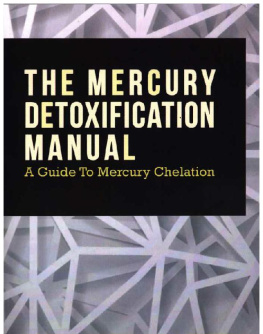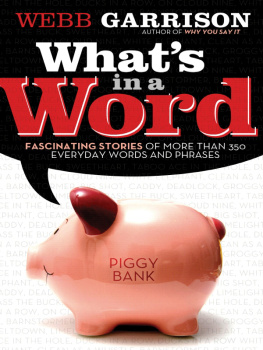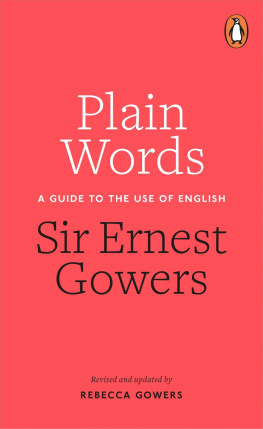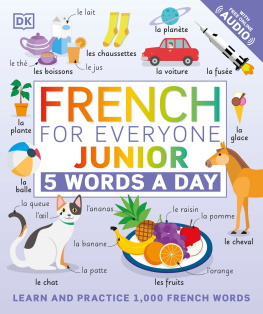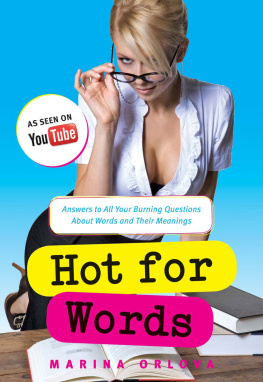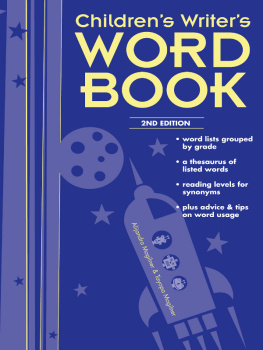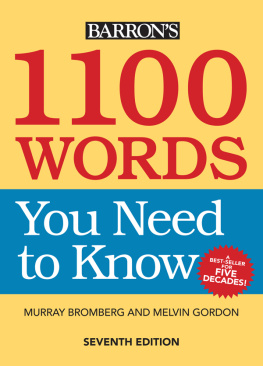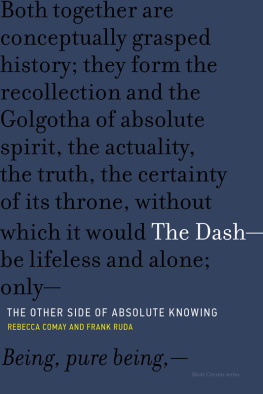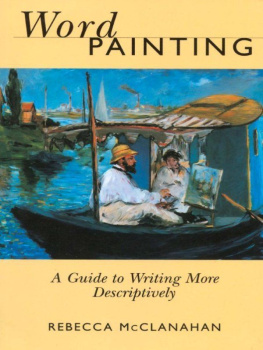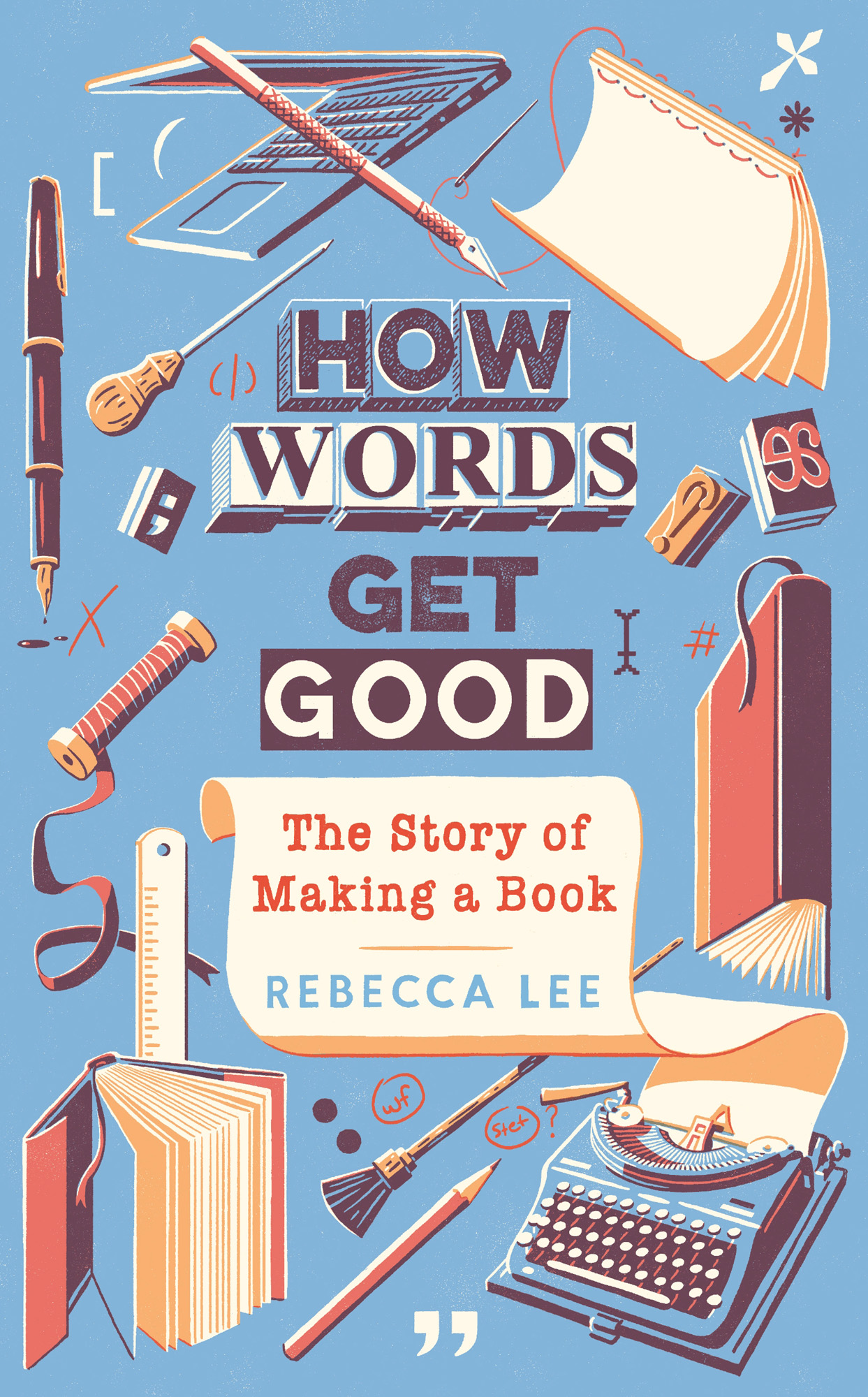Contents
Guide
HOW WORDS GET GOOD
HOW WORDS GET GOOD
T HE S TORY OF M AKING A B OOK
REBECCA LEE

First published in Great Britain in 2022 by
Profile Books Ltd
29 Cloth Fair
London
EC1A 7JQ
www.profilebooks.com
Copyright Rebecca Lee, 2022
Image p. Granger Historical Picture Archive/Alamy Stock Photo. All other images public domain/Wiki Commons.
While every effort has been made to contact copyright-holders of copyright material, the authors and publishers would be grateful for information where they have been unable to contact them, and would be glad to make amendments in further editions.
10 9 8 7 6 5 4 3 2 1
Printed and bound in Great Britain by
Clays Ltd, Elcograf S.p.A.
The moral right of the author has been asserted.
All rights reserved. Without limiting the rights under copyright reserved above, no part of this publication may be reproduced, stored or introduced into a retrieval system, or transmitted, in any form or by any means (electronic, mechanical, photocopying, recording or otherwise), without the prior written permission of both the copyright owner and the publisher of this book.
A CIP catalogue record for this book is available from the British Library.
ISBN 978 1 78816 637 9
eISBN 978 1 78283 759 6
In memory of Patricia Mary Lee,
who taught me my first words
A book is a version of the world. If you do not like it, ignore it; or offer your own version in return.
Salman Rushdie
INTRODUCTION: WELCOME TO THE GUTENBERG GALAXY
There is no frigate like a book.
Emily Dickinson
In 1962 Canadian philosopher Marshall McLuhan published a book called The Gutenberg Galaxy: The Making of Typographic Man. In it, McLuhan explored the role of mass media (and especially the printing press) in human society, and its impact on human consciousness. The Gutenberg Galaxy divided history into four epochs: oral tribe culture, manuscript culture, the Gutenberg Galaxy the name McLuhan chose for the era of movable type and mass printing and, finally, the era to come, the electronic age.
McLuhans concept of the Gutenberg Galaxy took its name from Johannes Gutenberg, the German printer who changed the world with the invention of movable type and mechanical mass-produced printing in Renaissance Europe. The phrase Gutenberg Galaxy reminds us that, in whatever format they appear, every word is part of a vast and dynamic universe of all those that have ever been recorded whether on clay, papyrus, paper or silicon and all those still to be born.
Thats a lot of words. So many, in fact, that if we are to engage meaningfully with written culture, we need a way to sort and categorise all the words swirling round the Gutenberg Galaxy, to separate what we find to be good from what we find to be not-so-good. There simply isnt time for us to deal with all the words that are out there. We take on this monumental task in a variety of ways every book group, word-of-mouth recommendation, book review or book discussing another book is part of the human instinct to sort the good words from the bad.
We might decide that a collection of words bound together in a book or displayed on a digital screen is good because we find them readable, entertaining, inspiring, life-changing, informative, opinionated or profitable. Because they report history, change history or give a voice to those who might otherwise not be heard.
And the boundaries of good are wide and blurry. Some words are critically acclaimed, studied, analysed and disseminated across borders and across centuries. Others are airily dismissed by the literati, yet wildly popular with readers, who hold them to very different standards: those of comfort, titillation, humour, terror, familiarity, escape, melancholy and every other form of emotional resonance in the vast pantheon of the human experience. A book only needs to succeed on its own terms a brilliant whodunnit has different aims to a magisterial academic treatise on EU law.
So, every time a reader alights in a new corner of the Gutenberg Galaxy and starts to read, the pleasure and privilege of deciding which books are good is theirs. But book is just a name for a collection of words, and we can make those words better by what we choose to do with them. All collections of words (from sentences to entire books) can be improved, and in lots of different ways. This book is for anyone whos ever wondered just how words navigate from one side of the Gutenberg Galaxy to the other from the mind of the author to the eyes of the reader.
How do the words that we eventually hold in our hands in a book come to be? What are their stories? And how do those raw words coalesce into readable, recognisable phrases, sentences, paragraphs, pages and chapters? Finally, and in some ways most importantly, what frees those words to make the last step of their journey to leave their author behind and find their audience?
In between looking at how words get good, better and free, this book will shed light on the practical process of how the insides and outsides of books come together and demystify the alchemy that transforms raw unedited text to smooth readable prose. Every book has a parallel story: that of how it was created. There is the story that the words tell us, and then the journey behind how those particular words came to be on a page. Well meet the supporting cast needed for words to fulfil their potential, and hear from the people who make it happen; who make it their business and call it their passion to help words get good.
Oh, and every now and then well encounter some if not objectively, then at least arguably bad words, with which well no doubt have a good time. Life, literature and human nature being what they are, we can find real pleasure, interest and humour in reading words that are, by any reasonable consensus, bad. Bad words are the junk food of the literary world we know we shouldnt, but just sometimes, we do. Well also have close encounters with some lost words those we know once existed but that have disappeared from our view; and then those that were lost (and in some cases perhaps should have stayed that way) but have made their way back to new audiences.
Your (largely) reliable narrator
What qualifies me to know anything about how words get good? Over the course of twenty years working in the editorial department of one of the worlds largest publishers Ive signed off millions and millions of words for print. Words in every conceivable combination, language, tone, style and typeface. Ive edited, proofread, fact-checked, copy-checked, rewritten, edited again, indexed, re-indexed, checked corrections, dealt with authors, commissioned freelancers, calmed down commissioning editors, cooperated with typesetters and printers, and, finally, sent words to print.
Have I read all these words? No. Have I understood all those I have? Not entirely. Have I experienced the occasional slip along the path to making them good? Yes, indeed. Have I had an author email me (very politely, under the circumstances) to point out Id misspelt their name on the title page of their proofs? Mea culpa. Have I been part of a team that managed to print 20,000 copies of The Importance of Being Ernest? Speaking earnestly, I absolutely have.
As this might suggest, my job is at least as terrifying as it is satisfying. The longer I do it, the closer I must surely be edging towards a truly irrecoverable cock-up. In my worst moments the 3 a.m. ones, followed by the even worse 4 a.m. ones I wonder if I can carry on at all. Because I


